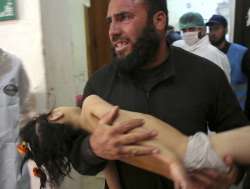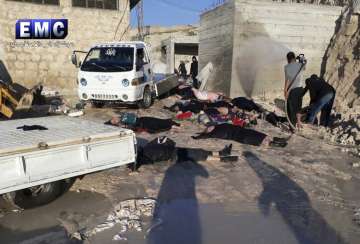Suspected gas attack kills at least 58 in Syria's Idlib: Monitoring group
Warplanes carried out a suspected chemical attack in a town in Syria's northern Idlib province, killing at least 58 people on Tuesday.

Warplanes carried out a suspected chemical attack in a town in Syria's northern Idlib province, killing at least 58 people on Tuesday, a monitoring group said.
Syrian opposition activists described the toxic gas attack as among the worst in the country's six-year civil war.
The Britain-based Syrian Observatory for Human Rights monitoring group put the death toll at 58, saying there were 11 children among the dead.
The Idlib Media Center said dozens of people had been killed. The center published footage of medical workers appearing to intubate an unresponsive man stripped down to his underwear and hooking up a little girl foaming at the mouth to a ventilator.
There was no comment from the government in Damascus or any international agency in the immediate aftermath of the attack.

The Syrian activists had no information on what agent could have been used in the assault. They claimed the attack was caused by an airstrike carried out either by the Syrian government or Russian warplanes.
The Syrian Coalition, an opposition group based outside the country, said government planes carried out the airstrike on Khan Sheikhoun, south of the city of Idlib, the provincial capital.
It said the planes fired missiles carrying poisonous gases, killing dozens of people, many of them women and children. The coalition described the attack as a "horrifying massacre."
Photos and video emerging from Khan Sheikhoun show limp bodies of children and adults. Some are seen struggling to breathe; others appear foaming at the mouth.
A medical doctor going by the name of Dr. Shajul Islam for fears for his own safety said his hospital in Idlib province received three victims, all with narrow, pinpoint pupils that did not respond to light. He published video of the patients on his Twitter account.
Pinpoint pupils, breathing difficulties, and foaming at the mouth are symptoms commonly associated with toxic gas exposure.
It was also not immediately clear if all those killed died from suffocation or wounds sustained in the airstrikes.
Makeshift hospitals soon crowded with people suffocating, activist said.
It was the third claim of a chemical attack in just over a week in Syria. The previous two were reported in Hama province, in an area not far from Khan Sheikhoun, the site of Tuesday's alleged attack.
Tuesday's reports came on the eve of a major international meeting in Brussels on the future of Syria and the region, to be hosted by the EU's High Representative Federica Mogherini.
Over 300,000 people have been killed in Syria since the conflict began in March 2011 with anti-government protests.
The Syrian American Medical Society, which supports hospitals in opposition-held territory, said it had sent a team of inspectors to Khan Sheikhoun before noon and an investigation was underway.
The province of Idlib is almost entirely controlled by the Syrian opposition. It is home to some 900,000 displaced Syrians, according to the United Nations. Rebels and opposition officials have expressed concerns that the government is planning to mount a concentrated attack on the crowded province.
Claims of chemical weapons attacks, particularly the use of the chlorine agent, are not uncommon in Syria's conflict. The worst attack was what a U.N. report said was an attack by toxic sarin gas in August 2013 on the Damascus suburb of Ghouta that killed hundreds of civilians.
The New York-based Human Rights Watch has accused the Syrian government of conducting at least eight chemical attacks using chlorine gas on opposition-controlled residential areas during the final months in the battle for Aleppo last year that killed at least nine civilians and injured 200.
Also, a joint investigation by the United Nations and the international chemical weapons watchdog determined the Syrian government was behind at least three attacks in 2014 and 2015 involving chlorine gas and the Islamic State group was responsible for at least one involving mustard gas.
(With AP inputs)
